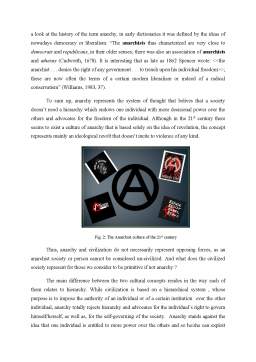Extras din referat
What do civilization and being considered civilized mean? What does anarchy represent? We all have heard these terms at least once in our lifetime, weather they showed up in the news or they were just mentioned by a person we know. Ask any citizen of the so-called First World countries (e.g. countries with a stable economy and a democratic political system that have little politic risk and a high standard of living, such as most countries in Europe) what is their definition of a civilized nation and they will probably describe the state in which they live. In the same manner, anything that seems to threaten the current state of the world is said to cause anarchy.
Consequently, there is this tendency of treating civilization and anarchy as opposite forces. But is anarchy indeed the arch-nemesis of civilization? And is a civilized state preferable to a state of anarchy ? Before proceeding in analyzing the differences between the two concepts, we should understand the implications of each of them. From a cultural point of view, both of the terms have debatable meanings and their definitions have changed through history.
When we think of civilization, probably some of the first words that appear in our minds are: society, community, state, modern/new world, education, culture and so on. As Williams (1983,57) states in his Keyword - A vocabulary of culture and society: “Civilization is now generally used to describe an achieved state or condition of organized social life”. Also, the term can be used to describe a set of moral values, a set of norms or a way of thinking, as well as an area or a community: “Loosely used, <<a civilization>> means an area, group or period distinguished, in the mind of the person using the term, by striking continuities in ways of life and thought and feeling. So we can speak of <<Western civilization>>, or the civilizations of China or Islam, or of <<Jewish civilization>> or <<classical civilization>> or <<the civilization of the Renaissance>>, and readers or listeners will know roughly what we mean.” (Felipe, 2001, 12). But this somewhat wide definition can also be used to explain the concepts of society and culture.
Indeed, civilization is associated with and defined through the human society. In fewer words, we could say that a civilization represents any complex society characterized by order, that functions according to a hierarchy imposed by the existing authorities and institutions. A state is considered civilized when it is ruled by a higher authority that ensures the safety and comfort of all the citizens.
Another meaning of the term, which makes it difficult to differentiate between culture and civilization, is that of a process. Yet, civilization is said to represent a process of educating a nation, of refining its culture. Therefore, we can say that civilization includes culture. In addition, Felipe (2001, 13) states that: “At a further level, the word <<civilization>> denotes a process of collective self-differentiation from a world characterized, implicitly or explicitly, as <<barbaric>> or <<savage>> or <<primitive>>. By extension, societies judged to have achieved such self-differentiation are called <<civilized>>”.
On the one hand, civilization can be defined as a complex human society with a refined culture, that functions based on a hierarchy and ensures the safety and comfort of all its inhabitants. On the other, it can be considered a process of refine a nation’s culture as to reach a higher moral and living standard or a differentiation of what is believed to be primitive and underdeveloped. Which is why, most often than not, the term implies the idea of refinement, of progress, of evolution. Thus, the notion of civilization can be defined as opposed to those of barbarism, savagery, wildness, usually associated with a low-culture, an underdevelopment of the society and further more with anarchy: “Progress was identified with the renunciation of nature. Reversion to the wild was derogation ( ) Savages might be <<noble>> and set examples of heroic valor and moral superiority; but once rescued from the wild, they were expected to renounce it forever” (Felipe, 2001, 13).
Bibliografie
Primary sources:
1. Williams, Raymond. Keywords - A vocabulary of culture and society. New York: Oxford University Press, 1983
2. Fernîndez-Armesto, Felipe. Civilizations: Culture, Ambition, and the Transformation of Nature. New York: The Free Press, 2001
3. Franks, Benjamin; Jun, Nathan; Williams, Leonard. Anarchism: A Conceptual Approach. New York: Routledge, 2018
Secondary sources:
1. Wei, Ruan. “Civilization and Culture”. Globality Studies Journal issue 24 (28 May 2011): https://gsj.stonybrook.edu/wp-content/uploads/2011/05/0024Wei.pdf
2. Arnold, Matthew. Culture and Anarchy. London: Smith, Elder & CO., 1882
3. Scott, James C. The Art of Not Being Governed. An Anarchist History of Upland Southeast Asia. New Haven & London: Yale University Press, 2009
Web sources:
1. Green, John (CrashCourse). “Rethinking Civilization - Crash Course World History 201”. Youtube, July 11, 2014. https://www.youtube.com/watch?v=wyzi9GNZFMU
Preview document
Conținut arhivă zip
- Civilization versus Anarchy.docx






